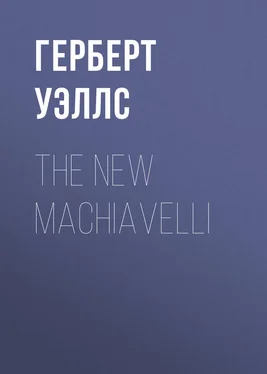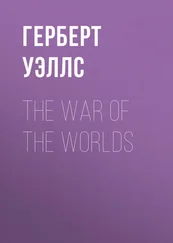Герберт Уэллс - The New Machiavelli
Здесь есть возможность читать онлайн «Герберт Уэллс - The New Machiavelli» — ознакомительный отрывок электронной книги совершенно бесплатно, а после прочтения отрывка купить полную версию. В некоторых случаях можно слушать аудио, скачать через торрент в формате fb2 и присутствует краткое содержание. Жанр: foreign_prose, foreign_sf, на английском языке. Описание произведения, (предисловие) а так же отзывы посетителей доступны на портале библиотеки ЛибКат.
- Название:The New Machiavelli
- Автор:
- Жанр:
- Год:неизвестен
- ISBN:нет данных
- Рейтинг книги:3 / 5. Голосов: 1
-
Избранное:Добавить в избранное
- Отзывы:
-
Ваша оценка:
- 60
- 1
- 2
- 3
- 4
- 5
The New Machiavelli: краткое содержание, описание и аннотация
Предлагаем к чтению аннотацию, описание, краткое содержание или предисловие (зависит от того, что написал сам автор книги «The New Machiavelli»). Если вы не нашли необходимую информацию о книге — напишите в комментариях, мы постараемся отыскать её.
The New Machiavelli — читать онлайн ознакомительный отрывок
Ниже представлен текст книги, разбитый по страницам. Система сохранения места последней прочитанной страницы, позволяет с удобством читать онлайн бесплатно книгу «The New Machiavelli», без необходимости каждый раз заново искать на чём Вы остановились. Поставьте закладку, и сможете в любой момент перейти на страницу, на которой закончили чтение.
Интервал:
Закладка:
Britten writhed, appreciating the image.
“There’s to be a section of sports. YOU must do that.”
“I’m not going to do any fine writing,” said Shoesmith.
“What you’ve got to do is just to list all the chaps and put a note to their play: – ‘Naylor minor must pass more. Football isn’t the place for extreme individualism.’ ‘Ammersham shapes well as half-back.’ Things like that.”
“I could do that all right,” said Shoesmith, brightening and manifestly becoming pregnant with judgments.
“One great thing about a magazine of this sort,” said Cossington, “is to mention just as many names as you can in each number. It keeps the interest alive. Chaps will turn it over looking for their own little bit. Then it all lights up for them.”
“Do you want any reports of matches?” Shoesmith broke from his meditation.
“Rather. With comments.”
“Naylor surpassed himself and negotiated the lemon safely home,” said Shoesmith.
“Shut it,” said Naylor modestly.
“Exactly,” said Cossington. “That gives us three features,” touching them off on his fingers, “Epigram, Literary Section, Sports. Then we want a section to shove anything into, a joke, a notice of anything that’s going on. So on. Our Note Book.”
“Oh, Hell!” said Britten, and clashed his boots, to the silent disapproval of every one.
“Then we want an editorial.”
“A WHAT?” cried Britten, with a note of real terror in his voice.
“Well, don’t we? Unless we have our Note Book to begin on the front page. It gives a scrappy effect to do that. We want something manly and straightforward and a bit thoughtful, about Patriotism, say, or ESPRIT DE CORPS, or After-Life.”
I looked at Britten. Hitherto we had not considered Cossington mattered very much in the world.
He went over us as a motor-car goes over a dog. There was a sort of energy about him, a new sort of energy to us; we had never realised that anything of the sort existed in the world. We were hopelessly at a disadvantage. Almost instantly we had developed a clear and detailed vision of a magazine made up of everything that was most acceptable in the magazines that flourished in the adult world about us, and had determined to make it a success. He had by a kind of instinct, as it were, synthetically plagiarised every successful magazine and breathed into this dusty mixture the breath of life. He was elected at his own suggestion managing director, with the earnest support of Shoesmith and Naylor, and conducted the magazine so successfully and brilliantly that he even got a whole back page of advertisements from the big sports shop in Holborn, and made the printers pay at the same rate for a notice of certain books of their own which they said they had inserted by inadvertency to fill up space. The only literary contribution in the first number was a column by Topham in faultless stereotyped English in depreciation of some fancied evil called Utilitarian Studies and ending with that noble old quotation: —
“To the glory that was Greece and the grandeur that was Rome.”
And Flack crowded us out of number two with a bright little paper on the “Humours of Cricket,” and the Head himself was profusely thoughtful all over the editorial under the heading of “The School Chapel; and How it Seems to an Old Boy.”
Britten and I found it difficult to express to each other with any grace or precision what we felt about that magazine.
CHAPTER THE FOURTH ~~ ADOLESCENCE
1
I find it very difficult to trace how form was added to form and interpretation followed interpretation in my ever-spreading, ever-deepening, ever-multiplying and enriching vision of this world into which I had been born. Every day added its impressions, its hints, its subtle explications to the growing understanding. Day after day the living interlacing threads of a mind weave together. Every morning now for three weeks and more (for to-day is Thursday and I started on a Tuesday) I have been trying to convey some idea of the factors and early influences by which my particular scrap of subjective tapestry was shaped, to show the child playing on the nursery floor, the son perplexed by his mother, gazing aghast at his dead father, exploring interminable suburbs, touched by first intimations of the sexual mystery, coming in with a sort of confused avidity towards the centres of the life of London. It is only by such an effort to write it down that one realises how marvellously crowded, how marvellously analytical and synthetic those ears must be. One begins with the little child to whom the sky is a roof of blue, the world a screen of opaque and disconnected facts, the home a thing eternal, and “being good” just simple obedience to unquestioned authority; and one comes at last to the vast world of one’s adult perception, pierced deep by flaring searchlights of partial understanding, here masked by mists, here refracted and distorted through half translucent veils, here showing broad prospects and limitless vistas and here impenetrably dark.
I recall phases of deep speculation, doubts and even prayers by night, and strange occasions when by a sort of hypnotic contemplation of nothingness I sought to pierce the web of appearances about me. It is hard to measure these things in receding perspective, and now I cannot trace, so closely has mood succeeded and overlaid and obliterated mood, the phases by which an utter horror of death was replaced by the growing realisation of its necessity and dignity. Difficulty of the imagination with infinite space, infinite time, entangled my mind; and moral distress for the pain and suffering of bygone ages that made all thought of reformation in the future seem but the grimmest irony upon now irreparable wrongs. Many an intricate perplexity of these broadening years did not so much get settled as cease to matter. Life crowded me away from it.
I have confessed myself a temerarious theologian, and in that passage from boyhood to manhood I ranged widely in my search for some permanently satisfying Truth. That, too, ceased after a time to be urgently interesting. I came at last into a phase that endures to this day, of absolute tranquillity, of absolute confidence in whatever that Incomprehensible Comprehensive which must needs be the substratum of all things, may be. Feeling OF IT, feeling BY IT, I cannot feel afraid of it. I think I had got quite clearly and finally to that adjustment long before my Cambridge days were done. I am sure that the evil in life is transitory and finite like an accident or distress in the nursery; that God is my Father and that I may trust Him, even though life hurts so that one must needs cry out at it, even though it shows no consequence but failure, no promise but pain…
But while I was fearless of theology I must confess it was comparatively late before I faced and dared to probe the secrecies of sex. I was afraid of sex. I had an instinctive perception that it would be a large and difficult thing in my life, but my early training was all in the direction of regarding it as an irrelevant thing, as something disconnected from all the broad significances of life, as hostile and disgraceful in its quality. The world was never so emasculated in thought, I suppose, as it was in the Victorian time…
I was afraid to think either of sex or (what I have always found inseparable from a kind of sexual emotion) beauty. Even as a boy I knew the thing as a haunting and alluring mystery that I tried to keep away from. Its dim presence obsessed me none the less for all the extravagant decency, the stimulating silences of my upbringing…
The plaster Venuses and Apollos that used to adorn the vast aisle and huge grey terraces of the Crystal Palace were the first intimations of the beauty of the body that ever came into my life. As I write of it I feel again the shameful attraction of those gracious forms. I used to look at them not simply, but curiously and askance. Once at least in my later days at Penge, I spent a shilling in admission chiefly for the sake of them…
Читать дальшеИнтервал:
Закладка:
Похожие книги на «The New Machiavelli»
Представляем Вашему вниманию похожие книги на «The New Machiavelli» списком для выбора. Мы отобрали схожую по названию и смыслу литературу в надежде предоставить читателям больше вариантов отыскать новые, интересные, ещё непрочитанные произведения.
Обсуждение, отзывы о книге «The New Machiavelli» и просто собственные мнения читателей. Оставьте ваши комментарии, напишите, что Вы думаете о произведении, его смысле или главных героях. Укажите что конкретно понравилось, а что нет, и почему Вы так считаете.











